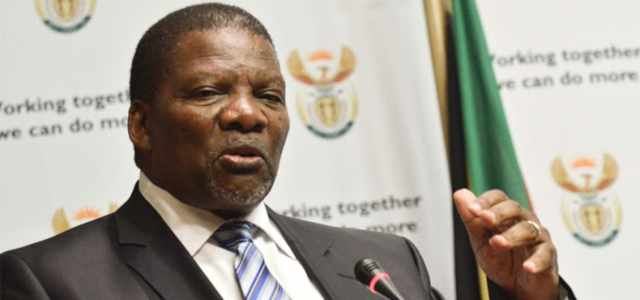South Africa’s Minister of Water and Sanitation Gugile Nkwinti said the two are critical resources that are reciprocally and mutually linked and fundamental to job creation in a region characterised by high levels of unemployment especially among the youth.
The minister was speaking at the joint meeting of the Southern African Development Community (SADC) Ministers responsible for Energy and Water in Johannesburg.
The objectives of the meeting will serve as inputs from the Energy and Water sectors at the 38th Summit due in August 2018. The meeting reviewed progress in the implementation of the decisions of Ministers at their last meetings; considered progress in the implementation of the energy of the energy and water programmes and projects; and to also deliberated on and gave guidance on the security of energy and water supply, to ensure food security and economic and industrial development in the SADC region as per the request of the Chairperson of the Summit.
The meeting set out to solicit inputs from member states’ Ministers in terms of how to achieve efficient, seamless, integrated and cost-effective cross-boundary infrastructure networks and services.
Minister Gugile Nkwinti noted that meeting energy needs depends upon the availability of water, often in large quantities, for mineral extraction and mining, fuel production, hydropower, and thermoelectric power plant cooling. Likewise, energy is required for the pumping, conveyance, treatment and conditioning, and distribution of water and for collection, treatment, and discharge of waste water.
The SADC region has a powerful and stable emerging economy where the role of energy is critical to the success of achieving macroeconomic goals such as real economic growth. Cheap, accessible and affordable electricity and competitively-priced transport fuels are critical for sustained industrial growth. The regional political stability, progressive economic policies and the managed liberalisation of core sectors of the economy have established the sound political economic base from which to stimulate economic growth.
The Minister said that water is needed across a wide spectrum of services, including tourism, energy generation, irrigation, maintaining ecosystems’ integrity, stock watering, mining and industrial activities, to name but a few. To supply water to these various needs, energy is key.
He noted that South African Government embraced the Nexus Approach since it calls for integrated planning amongst sectors. “It is thus important that proper planning of the development, utilisation and management of these resources is prioritised and done in an integrated manner,” noted Nkwinti.
During the meeting, the ministers were informed of the 8th SADC Water Multi-stakeholder dialogue that was successfully organized by GWPSAF in 2017 in South Africa. The objective of the Dialogue was to provide a platform for water, energy, agriculture and economic planning policymakers and practitioners to develop strategies that would ensure that nexus approaches contributed to fostering regional value chains and job creation.
The ministers were asked to direct SADC Secretariat in collaboration with GWPSAF to engage potential cooperating partners for continued support of the SADC Water Multi-Stakeholder Dialogue, which is key in engaging beyond the water sector and responding to the regional development agenda.
The ministers were informed that the SADC Secretariat, assisted by GWPSAF, undertook a Scoping Study on the desirability and modalities for the establishment of the SADC Water Utilities Association. The 8th SADC RBOs Workshop recommended the finalization of the Scoping Study taking into account the comments from Member States. The Ministers were requested to direct SADC Secretariat to finalise the Water Utilities Association Study report, circulate to Member States to facilitate national consultations; and facilitate its presentation to the Ministers at their next meeting in 2019 for consideration.
On WEF nexus, the ministers were requested to direct SADC Secretariat to finalise the development of a nexus investment framework that would drive planning and implementation of joint projects and initiatives that would enhance job creation, water, energy and food security in the region. They were also requested to direct SADC to mobilise resources to build capacities of Member States in order to improve their skills to enhance sector coordination in building water, energy and food security.
The meeting was also informed that the Water Sector Gender Focal Persons had been meeting alongside a number of regional forums to contribute to regional processes. The support of German and UK Government through GIZ, is bringing together the SADC Gender Water Focal Persons and the Gender Machinery, under the guidance of the SADC Gender Unit and Water Division and coordinated by GWPSAF.
